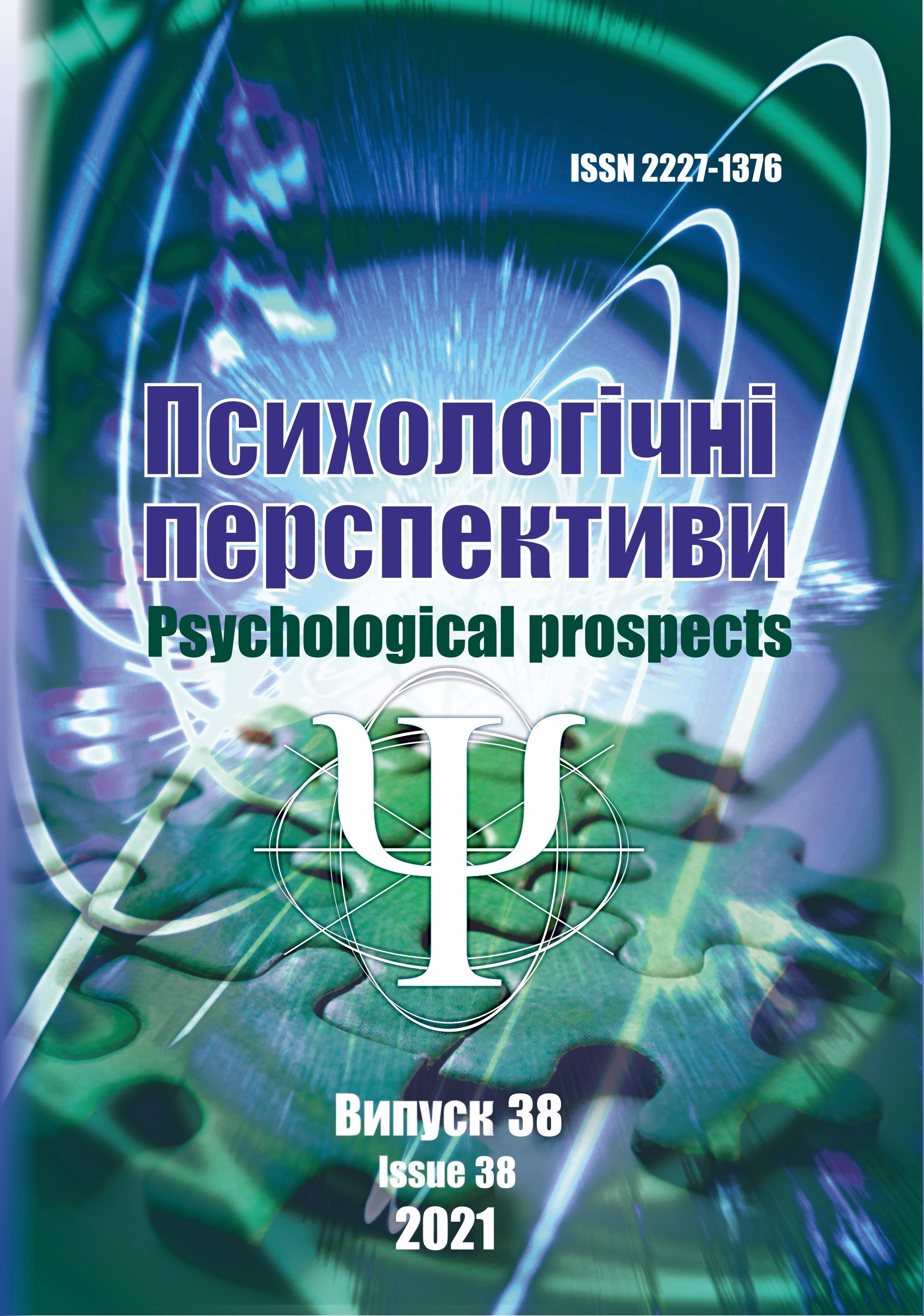Mediereligious activity as a factor of psychological well-being of personality
DOI:
https://doi.org/10.29038/2227-1376-2021-38-110-123Keywords:
mental health, media, religion, activity, copingAbstract
Purpose. The article provides an empirical analysis of the individual's psychological well-being in relation to its media-religious activity. Methods. To achieve the purpose of the study the following methods were used: standardized questionnaires (BASIC PH Internal Stability Methodology, Mental Health Stability - Short Form Questionnaire (MHCSF-UA) and F. Zimbardo's Time Perspective Questionnaire (Ukrainian-language adaptation by O. Senyk)), as well as the method of narrative. Pearson's correlation analysis and finding differences in the distribution of estimates among the statistical methods were used. Results. A significant number of respondents realize their need for religious affiliation through the media (61.7%). Media religious activity correlates with the type of self-narrative, positive assessment of the past, mental health stability, beliefs and values as a coping resource. That is, respondents who often turn to informational thematic sources and religious practices tend to evaluate their past positively, they have high rates of mental health stability. It has been found statistically significant differences in the indicators of psychological well-being of respondents who are media-religiously active and those who do not use religious resources in the media space. So, individual’s media-religious activity comprehend their experiences and find new meanings in them, more often feel happiness, opportunity to make an important contribution to society, interest in life, find support in faith and spiritual values that help to survive crises, and prone to rely on divine forces in the process of solving problems. Conclusions. Media religious activity is associated with high levels of psychological well-being, namely the stability of mental health, beliefs and values as a coping strategy for overcoming crises. Further research may look to clarify the relationships and differences between a person's media religiosity and other indicators of psychological well-being and mental health.References
Vyigotskiy, L.S. (1982). Problema razvitiya v strukturnoy psihologii [The problem of development in structural psychology]. T.1. M. [in Russian].
Nosenko, E. L., Chetveryk-Burchak, A. H. (2014). Opytuvalnyk «Stabilnist psykhichnoho zdorovia – korotka forma»: opys, adaptatsiia, zastosuvannia [Mental Health Stability - Short Form Questionnaire: description, adaptation, application]. Visnyk Dnipropetrovskoho universytetu. Seriia «Pedahohika i psykholohiia» - Bulletin of Dnipropetrovsk University. Series "Pedagogy and Psychology", 20, 89-97 [in Ukrainian].
Senyk, O., Abramov, V., Ruzhytska, M., Babatina, S., Bedan, V., Bunas, A., Dvornyk, M., Yevchenko, I., Klymenko, O., Kuzmenko, Ya., Lutsenko, O., Mandzyk, T., Okhrimenko, V., Riznyk R. (2017). Opytuvalnyk chasovoi perspektyvy F. Zimbardo: rezultaty validyzatsii rosiiskomovnoi versii na rosiiskomovnykh ukraintsiakh ta perehliadu kliuchiv ukrainskoi versii [Time perspective questionnaire F. Zimbardo: results of validation of the Russian-language version on Russian-speaking Ukrainians and revision of the keys of the Ukrainian version]. Humanitarnyi visnyk DVNZ “Pereiaslav-Khmelnytskyi derzhavnyi pedahohichnyi universytet imeni Hryhoriia Skovorody” - Humanitarian Bulletin of Pereyaslav-Khmelnytsky State Pedagogical University named after Hryhoriy Skovoroda, 37-1, VI (74), 428-449 [in Ukrainian].
Chepeleva, N.V. (Eds.) (2009). Problemyi psihologicheskoy germenevtiki [Problems of psychological hermeneutics]. K.: Izdatelstvo Natsionalnogo pedagogicheskogo universiteta im. N.P. Dragomanova [in Russian].
Ali, N.A., Feroz, A.S., Akber, N., et al. (2021). When COVID-19 enters in a community setting: an exploratory qualitative study of community perspectives on COVID-19 affecting mental well-being. BMJ Open, 11:e049851. DOI: https://doi.org/10.1136/bmjopen-2021-049851
Halafoff, A., Marriott, E., Smith, G., Weng, E., Bouma, G. (2021).Worldviews Complexity in COVID-19 Times: AustralianMedia Representations of Religion, Spirituality and Non-Religion in 2020. Religions, 12, 682. https://doi.org/10.3390/rel12090682
Helland, Ch. (2005). Online Religion as Lived Religion. Methodological Issues in the Study of Religious Participation on the Internet. Online—Heidelberg Journal of Religions on the Internet, 01.1. Special Issue on Theory and Methodology. DOI: https://doi.org/10.11588/heidok.00005823
Hiles, D. & Cermák, I. (2008). Narrative psychology. In The SAGE handbook of qualitative research in psychology (pp. 147-164). SAGE Publications Ltd, https://www.doi.org/10.4135/9781848607927
Huppert, F. A. (2009). Psychological Well-being: Evidence Regarding its Causes and Consequences. Applied psychology: health and well-being, 1 (2), 137–164. DOI: https://doi.org/10.1111/j.1758-0854.2009.01008.x
Kostruba, N. (2021). Social Restrictions in the COVID-19 Pandemic As a Traumatic Experience: Psycholinguistic Markers. East European Journal of Psycholinguistics, 8(1), 28-40. https://doi.org/10.29038/eejpl.2021.8.1.kos
Murray, M., & Ziegler, F. (2015). The narrative psychology of community health workers. Journal of health psychology, 20(3), 338–349. https://doi.org/10.1177/1359105314566615
Siuda, P. (2021). Mapping Digital Religion: Exploring the Need for New Typologies. Religions, 12, 373. https://doi.org/10.3390/rel12060373
Tajbakhsh, Gh. (2021). COVID-19 and the Lived Experience of People Facing it; a Quantitative Study. Journal of Education and Community Health, 8(2), 127-133. DOI: https://doi.org/10.52547/jech.8.2.127
Tang, Y-Y, Tang, R. and Gross, J.J. (2019). Promoting Psychological Well-Being Through an Evidence-Based Mindfulness Training Program. Front. Hum. Neurosci, 13, 237. DOI: https://doi.org/10.3389/fnhum.2019.00237
Vekemans, T. (2021). Crisis and Continuation: The Digital Relocation of Jain Socio-Religious Praxis during the COVID-19 Pandemic. Religions, 12, 342. https://doi.org/10.3390/rel12050342
Williams, M. J., Wagoner, Z., Rodman-Alvarez, S., Pasillas, V. & Sanchez, A. (2021) Prioritizing health: Churches response to the COVID-19 pandemic. Journal of Prevention & Intervention in the Community. DOI: https://doi.org/10.1080/10852352.2021.1924593
Downloads
Published
Issue
Section
License
Copyright (c) 2021 Kostruba N.

This work is licensed under a Creative Commons Attribution-NonCommercial 4.0 International License.






